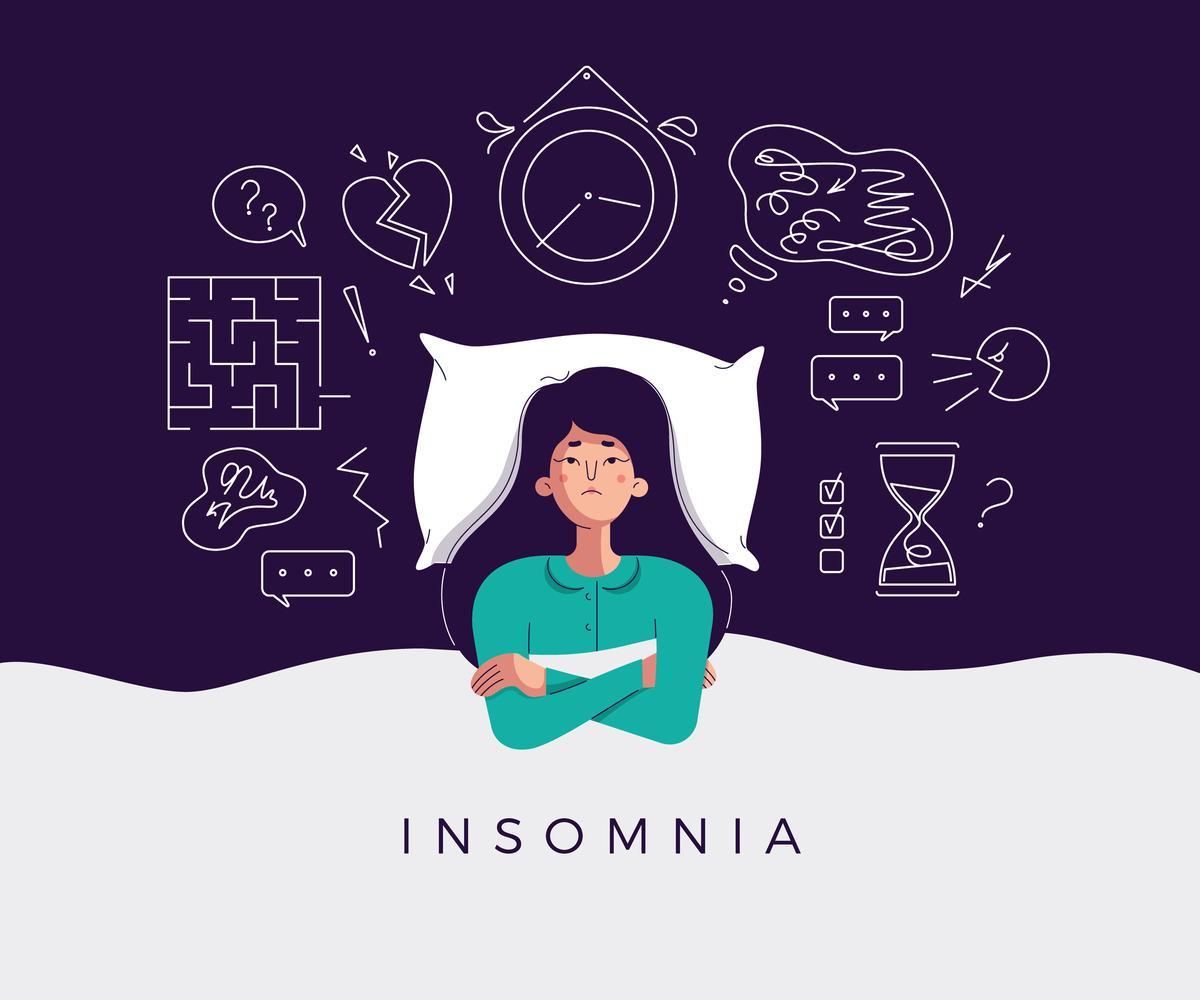Guide to Causes Of Insomnia In Females

In the quiet of the night, when everyone else is sleeping, some things can keep women awake, trapping them in the sleepless world of sleeplessness. The causes of insomnia in females are like a delicate dance between moonlight and thoughts. They show how complicated biology, feelings, and lifestyles work together.
However, the mind also becomes a creative force in insomnia, using stress, anxiety, and anxieties as mediums. The stresses of modern life, from work to relationships, generate lengthy shadows that keep us awake well after the sun has set.
As we delve into the fascinating root causes of insomnia in females, we begin to untangle the webs that keep them awake at night. Come with us as we explore the scientific, psychological, and womanly complexities to shed light on the road to better sleep and more joy in your days.
What is insomnia?
You are aware of how terrible it is when you are sleep deprived. Insomnia can greatly affect a person’s daily life by making them sleepy during the day, making it hard for them to focus, making them irritable, messing up their moods, and making them feel less well overall. It can also lead to health problems, such as a higher chance of accidents, long-term health problems, and a lower quality of life.
Many things can lead to insomnia, such as worry, anxiety, depression, medical conditions, drugs, bad sleeping habits, and environmental factors. It might be a one-time issue or a persistent issue. Studies show that about 10% of people have chronic insomnia, and between 15% and 35% of adults have short-term insomnia.
If you are not receiving enough sleep, your health may be compromised. How do you even determine if a person has insomnia, and how do you treat insomnia if it is present? Continue reading for answers to your most clarifying concerns.
What are the symptoms of insomnia in females?
Sleeplessness is a typical symptom of insomnia, especially among women. Some of the following symptoms
- Unable to sleep again after waking up during the night
- Fatigue
- An increased risk of falling
- Diabetes and high blood pressure
- An increased chance of accidents;
- An increased chance of obesity and stroke
- Increased stress and depression risk
Causes of insomnia in females
Due to insomnia, which can have a variety of causes of insomnia in females, getting a good night’s sleep is challenging.
-
Menstruation:
Contrary to popular opinion, menstruation is one of the leading causes of insomnia in females. This is because many hormones change when a woman has her period. Also, most women sleep and wake up at different times during their monthly cycle because it hurts. But if the pain keeps messing with your sleep-wake cycle, it could lead to sleeplessness. There’s no need to worry because drugs or cognitive-behavioral therapy can help.
-
Irregular sleep-wake cycle:
Sleeping properly and living a long, healthy life depends on maintaining a regular sleep schedule, and doing either can be detrimental to your health. You may be at risk of getting insomnia if your work schedule frequently requires you to adjust your sleep schedule. Moreover, the good thing about this is that it can be prevented and treated based on a few simple tweaks in the sleep-wake cycle.
-
Medications:
Long-term insomnia can be a side effect of taking medications that make it hard to get to sleep or stay asleep. Psychiatric illnesses that make it hard for you to sleep can be treated and managed with several medicines. It’s mostly because of the side effects of these medicines, but this doesn’t always cause sleeplessness. But these medicines can cause problems in the long run. You might get insomnia if you have trouble sleeping often and for a long time.
-
Stress and depression:
Stress and depression are two mental health conditions that frequently cause insomnia, which makes it difficult to fall asleep and keeps you awake once you do. In addition, it might have a cumulative effect on your sleep, altering its duration and quality. You sleep more when you’re stressed, but the quality of your sleep suffers when you’re depressed. Insomnia can result from stress and depression if it is not monitored and controlled.
-
Pregnancy:
Some women experience insomnia during pregnancy, particularly in the third trimester. Some studies have found that as many as 30 percent of pregnant women have trouble sleeping. During This time, women are frequently awakened in the middle of the night by cramps or pain. As a result, significant changes in the regular sleep routine occur, leading to insomnia. So, if you are having difficulty getting your daily dose of sleep or having many restless nights, it is best to visit a doctor and get treated.
-
Menopause:
What causes of insomnia in females menopause? Menopause is a common condition generally observed in women, and it is a common factor that causes of insomnia in females. It is attributed to symptoms like hot flashes, which are common during this phase. However, not every woman who experiences hot flashes will be at risk for insomnia. It’s a disaster if these flashes disrupt your everyday routine. It may increase your chances of sleeplessness. The message is that if insomnia is interfering with your ability to operate properly, you should seek treatment from a doctor.
These are some of the most typical explanations for why women can’t sleep. You should also be aware of the factors that prevent sleep in the elderly. Some examples are poor sleep habits and a bad place to sleep, pain or a medical condition, not getting enough exercise, and sleep problems. So, one can improve their sleep by getting rid of worries, improving their sleeping surroundings, and getting into the habit of sleeping well.
Treatment of insomnia in females
Sleep is essential to everyone’s life to stay healthy; it’s just not about women. Because so many things can affect sleep, people of any gender need to talk to their doctor if they sleep less than the suggested hours if their sleep is often broken, or if they are noticeably sleepy or impaired during the day. With the help of a doctor, insomnia can often be successfully treated as a symptom of a deeper sleep disorder, physical illness, or mental health problem.
The treatment of insomnia in women is as follows:
-
Medicines:
If the symptoms of the disorder worsen, the medical practitioner may prescribe some medicines. The physician may suggest sleeping medications or antidepressants in this case. Reducing stress in this way can facilitate sleep. Follow your doctor’s instructions & buy modafresh 200MG online precisely when using this medication.
-
Regular exercise:
Daily exercise is recommended for those with insomnia since it can wear them out to the point where they finally sleep soundly and deeply. In addition, physical activity decreases tension, and a decrease in stress naturally results in better sleep. A good night’s sleep can also be attained through the practice of yoga or meditation.
-
Cognitive behavioral therapy:
Cognitive behavioral therapy is another way to treat sleeplessness that is safe and works well. It is a type of talk therapy that helps people change how they think, feel, and believe, which can help them sleep better. After many studies, some experts came to the conclusion that CBT is a great way to treat sleeplessness caused by periods, pregnancy, or menopause.
Conclusion:
In this blog we explain the causes of insomnia in females deeply I hope we include an important topic. Many women experience insomnia, a common sleep problem. Hormonal shifts, illnesses, drugs, and even lifestyle choices can all play a role.
Sleep hygiene, behavioral therapy, medicine, natural cures, and other approaches are all useful in treating insomnia.
Seeing a doctor for a proper diagnosis and treatment of insomnia is essential if you suspect you have the condition.
[WPSM_AC id=5418]







